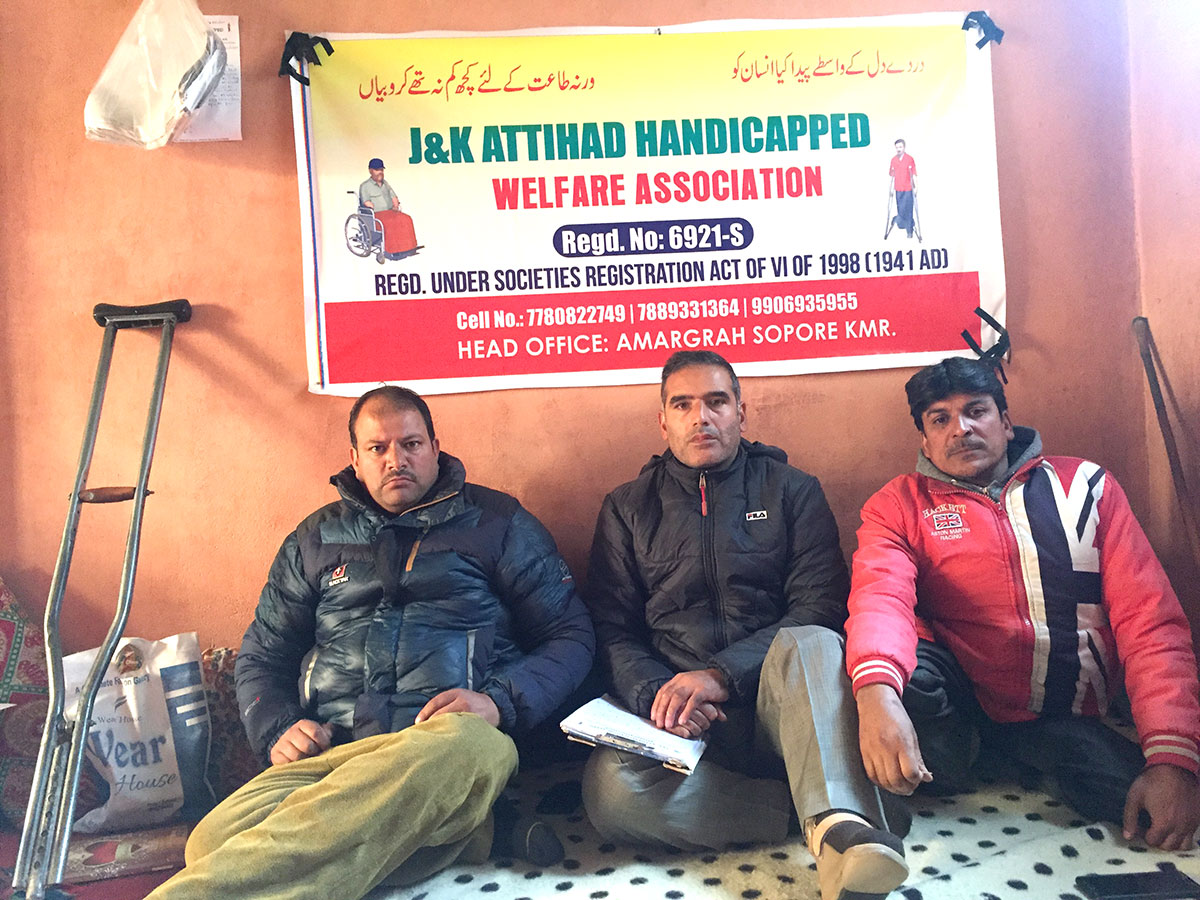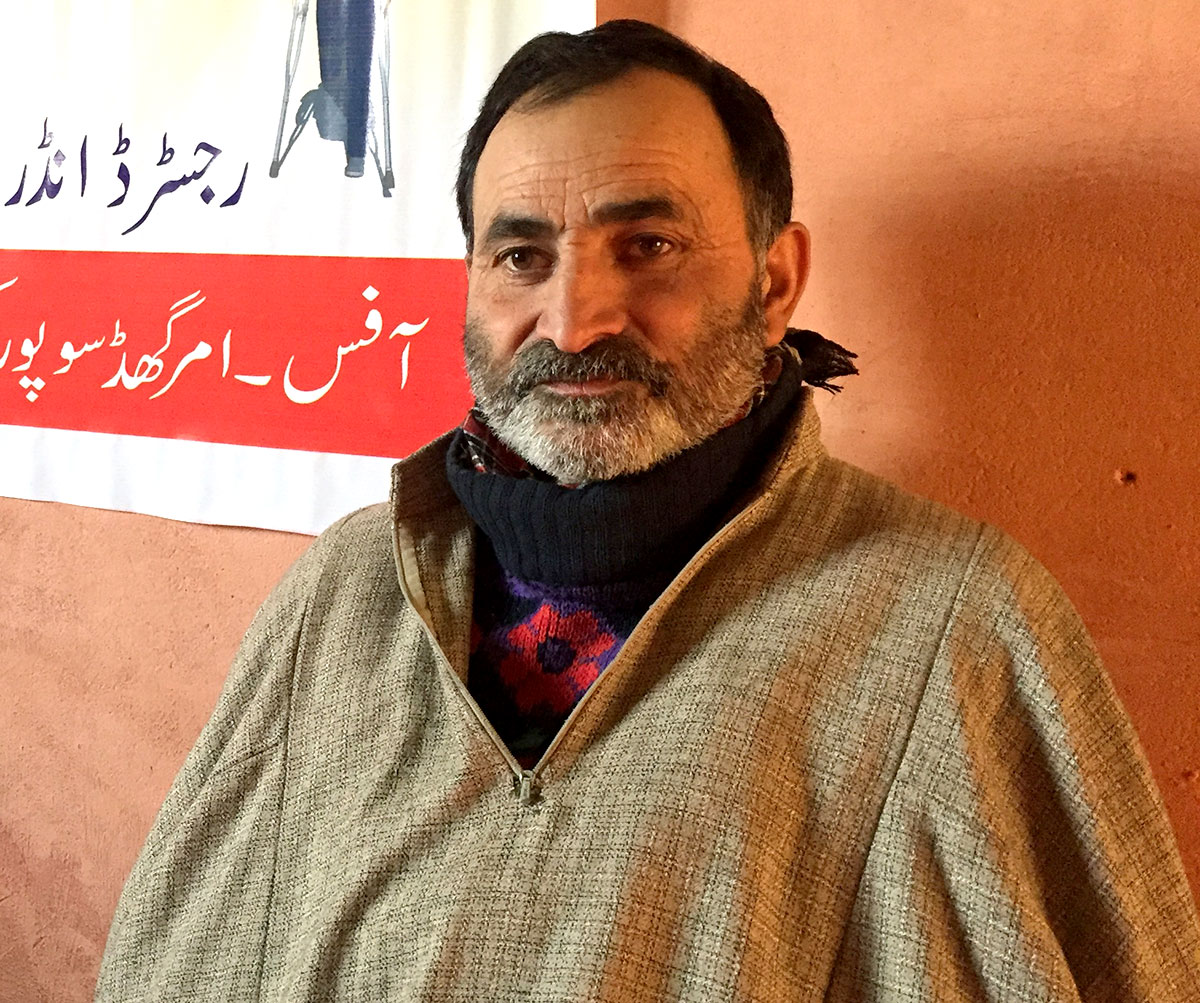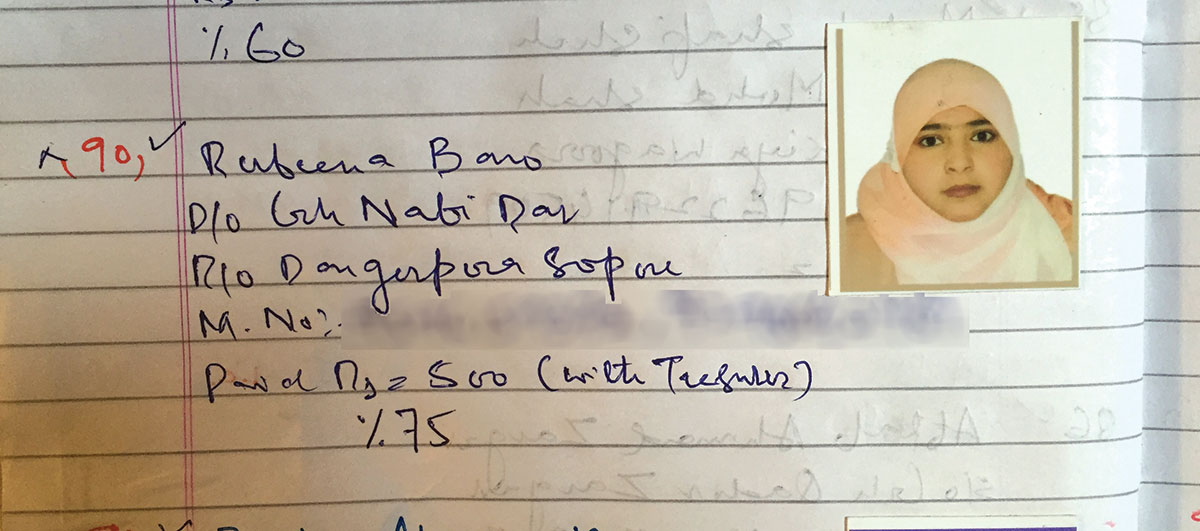When the society and the government looked down at them and, in certain cases, even families saw them as burden, fate got a couple of like-minded handicapped persons in touch with each other. Shams Irfan tells many stories of individuals’ struggles that eventually paved way for an association for the betterment of this least privileged lot in north Kashmir

Tariq (Second from left) and Farooq (Right side)
A small rented room located on the first floor of a rundown building in Amargarh, Sopore, is among a few places where Farooq Ahmad Dar, 40, and other physically disabled people like him feel at home.
This is where they can freely talk to each other, joke around, share their problems, find solutions, and be themselves, without being judged or looked down by the society.
This room serves as office for Jammu and Kashmir Handicapped Attehad Welfare Association (JKHAWA). Started in 2009, JKAWA has over 300 members registered with them from across Baramulla district. This room is their small universe.
Every day Farooq, a resident of Hudipora village, parks his tricycle outside the building and climbs a narrow and dark staircase, using a long stick to balance his body. It is a painful process but he has no other option. He knows an office for handicapped persons should not be at the first floor. But he blames lack of support from the government for this irony. “It is not easy for people like us,” he said pointing at his lifeless legs.
At the age of three Farooq had a fall from the second floor window of his house; since then he cannot move his legs. His struggle started almost immediately.
Born to a poor farmer father and housewife mother, cost of the treatment drained his family financially. Despite that Farooq was enrolled in a local government school. However, he quit his studies in tenth class. “It was painful as well as humiliating to drag my body all the way to school located two kilometres away,” said Farooq.
After idling a few days at home Farooq decided to learn how to weave carpets so that he could earn on his own. He contacted a local carpet weaver, who owned a loom, and requested him for help. “He was discouraging as he sent me home saying it requires lots of efforts to weave a carpet, which a handicapped person like me cannot do,” recalls Farooq.
It pinched young Farooq. That day he came back home sad. “I told my mother and elder brother about it,” recalls Farooq. “It pained them too. That was the first time when I felt helpless.”
The next morning Farooq’s elder brother got a loom from a nearby market and arranged two expert carpet weavers to teach him. “I was a quick learner as it took me just 28 days to master the art,” said Farooq.
For next few years Farooq earned his living by weaving carpets. At one stage, Farooq employed five weavers. “I made good money thanks to my brother,” said Farooq. “But our carpet’s lost demand and market when war broke out between Iran and Iraq. I lost some money as well.”
It was when Farooq decided to become a tailor as the job suited his handicap. “A tailor doesn’t have to move around much like a carpet weaver. So it was good for me,” said Farooq.
The only time Farooq used to move out of his tailoring shop was when he would visit local Social Welfare Department, to enquire the status of his monthly stipend.
Back then, every handicapped person registered with the department got Rs 350 per month as government assistance. Now the amount is Rs 1000 a month.

Sheikh A Rasheed
It was during these outings Farooq came in touch with other handicapped persons like him. “I realised there are hundreds of issues that people like myself face in their day-to-day lives but there is no one to help them,” said Farooq.
This realisation forced Farooq to think beyond his tailoring shop, which helped him earn a decent livelihood by then.
So in order to know more about the issues faced by handicapped people like him, Farooq’s visits to the Social Welfare Department office became frequent.
In November 2009, after a number of informal meetings, Farooq and a few other handicapped persons like him decided to have a formal meeting in a public park in Baramulla town.
“It was there we decided to form an association for handicapped people living in Baramulla district. The aim was to highlight our plight and press for our rights,” said Farooq.
But none of them knew how to get an association registered and where. They took help from Bashir Ahmad Dar, who works with Human Aid Society, for documentation and registration.
However, after a couple of meeting and the initial enthusiasm, Farooq and other specially-abled people like him failed to make much impact on the ground. “We lacked someone who could have guided us in our endeavour,” said Farooq.
Around same time there was someone else who was making similar efforts to help handicapped people in Baramulla. He too had been unsuccessful so far. Then he met Farooq.
UNDERSTANDING PAIN
In early 2009, Tariq Ahmad Sheikh, 43, a resident of Sopore, placed an advertisement in a local daily newspaper asking all specially-abled persons living in Baramulla to assemble in a public park on a particular day. Only eleven people showed up. There are over three thousand specially-abled persons in Baramulla district.
Like Farooq, Tariq too wanted to form an association for the welfare of specially-abled people.
“I was agitated that nobody talked about our problems. As if we didn’t exist at all in this society,” said Tariq.
The agitation was outcome of Tariq’s inability to get a job despite completing his graduation. “It is not easy for people like us to study. One should not see us from the same lens as they see physically-abled students,” said Tariq.
It was at the age of six that Tariq was detected with polio in his left leg. For next nine years Tariq had to use his hands to walk instead of his legs. “Up to fifth primary the school I attended was near my house. I was helped by my parents to reach there every day,” said Tariq.
The next level school was located one kilometre away, which Tariq would cover by using his hands to walk. “It was a painful process,” said Tariq.
After passing his eighth class examination with modest score, Tariq was faced with one more challenge: how to reach school which was around 2.5 kilometres away from his house.
“I was feeling ashamed to walk using my hands. It was humiliating but I wanted to study so I kept struggling,” said Tariq. “Giving up would have ended all my dreams.”
A year later, when Tariq was in ninth standard, he underwent a surgery which he was told would help him walk using crutches. The procedure took three years and multiple painful surgeries.
“My left leg is 2.5 inch shorter than the other one. But with the help of surgeries, I am now able to walk on my own using crutches,” said Tariq. According to government’s classification Tariq is still over 80 percent disabled.
But with mobility came confidence and self-respect which Tariq lacked earlier. “It helped me become independent in a way. I could now do my day-to-day chores at least,” said Tariq.
After completing his graduation Tariq was sure he would get a decent job as society would appreciate his efforts, hard-work and talent. But he was proved wrong. “There is no compassion in our society for people like us. Instead, we are humiliated by our fellow citizens on a daily basis,” said Tariq sadly. ”Even our families consider us burden at times.”
Tariq is currently working as a daily-wager in Irrigation and Flood Control Department, Sopore. He quit his post graduation mid-way to earn his livelihood.
It was during this phase that Tariq decided to create a platform for people like him. After his efforts failed, he was introduced to Farooq by their common friend Sheikh Abdul Rasheed.
SHARING PAIN
Tariq, who is currently the General Secretary of JKHAWA, helped shape the association and rope in people from across Baramulla district and beyond.
By early 2013, Tariq and Farooq were able to introduce JKHAWA formally in all official and local political circles.
They were also collecting donations for the upkeep of the organization during Ramazan, the Muslim month of fasting. The same year Tariq and Farooq, along with other members of the association got their first tricycle under Operation Sadbhavna.
“I kept it for myself as it helped me move around which was not possible earlier,” said Farooq.
The same year Farooq managed three more scooties for his team from the same source. This helped his team to move around freely. Finally in 2014, JKHAWA got registered. Later that year Farooq distributed 30 sewing machines among specially-abled people from as many villages. These machines were donated by the officer heading the local garrison.
Same year Farooq and his team came in touch with a businessman from Ganderbal named Ghulam Ahmad Mir aka Iqbal. His association with them helped JKHAWA substantially. Iqbal was born normal but lost his right leg in an accident when he was in college. Despite the disability, Iqbal has managed to establish a successful business in Ganderbal. “I didn’t give up,” said Mir.
One day while sitting in his office a specially-abled youngster came to him and asked for some money. His plight pained Iqbal. It was there he vowed to do something meaningful for people like himself so that they don’t have to beg for money, like the youngster. A few months later he came in touch with Tariq and Farooq.
Connected by common cause and pain, Tariq, Farooq and Iqbal now conduct regular awareness programmes for specially-abled people. “Who can understand our pain better than us,” said Tariq.
SMALL CHANGE
Rubeena Bano, a resident of Dangerpora village is pursuing post graduation from Sopore. Disabled in both legs, Rubeena cannot walk and needed help from her parents to reach school.
Till graduation her father used to carry her all the way to the nearest bus stop and then from Sopore bus stop to her college. It was painful for Rubeena and her parents.
However, unlike most of the specially-abled people, Rubeena didn’t give up her studies.
In mid-2016, Rubeena came in contact with JKHAWA and narrated her painful ordeal to Tariq and Farooq.
“We got her a specially modified scooter from Social Welfare Department’s rehabilitation scheme,” said Tariq.
With the help of the scooter, Rubeena is now able to travel to Sopore on her own. “These small interventions change a specially-abled person’s life completely. This cannot be understood by people who are born normal,” said Farooq.
In 2014, Mushtaq Ahmad Bhat, 40, a labourer from Hail village in Kreeri, fell from a tree while working. This accident left him bedridden for life. A father of two sons and two daughters, Mushtaq lost hope to live. When Tariq and Farooq came to know about his plight, they paid him a visit.
“We understand what it feels to be immobile in life,” said Farooq. “So, we tried to give him hope by telling him our stories of struggle and small achievements.”
After year-long counselling, Tariq and Farooq arranged a scooty for Mushtaq and encouraged him to at least get out of his house, where he had locked himself after the accident.
“Now he can at least go out and do small chores on his own without feeling completely disabled,” said Tariq. “We cannot change his fate, but we try share his pain to an extent.”
Tariq is pained when the society shows indifference towards specially-abled people like him. “It is not our fault that we are born this way. We don’t ask for money but please show some compassion towards us,” said Tariq.
As per 2011 census, there are over 3.60 lakh people with disabilities in Jammu and Kashmir. Out of them 2.80 lakh are visually impaired, 38000 physically challenged, 17000 have speech disability, and 13000 are hearing impaired. Census suggests J&K has the highest number of disabled population as compared to other states.
“Every day people like Mushtaq are added to the list because of accidents and conflict,” said Tariq.
The same indifference by the society brought Sheikh Abdul Rasheed in JKHAWA’s fold. Rasheed recalls vividly how a local Tehsil officer asked him to prove his disability by walking in front of him in a rude manner. The officer was authorised to sanction cases on basis of medical report in front of him, for monthly stipend to specially-able.

Rubeena Bano
“But he made everyone prove their disability in front of an almost laughing crowd of officials,” Rasheed, who needs crutches to walk, remembers. “This hurt me the most.” Rasheed is currently District President Baramullah for JKHAWA.
“I confronted that officer and took him to task. But he had already done what he wanted to; humiliate us,” said Rasheed.
Now after being part of an association Rasheed feels confident in front of government officials.
“We don’t ask for favours from anyone. We just want to live as equals in this society without any discrimination,” said Rasheed, who had to visit West Bengal to get his bride. “No one was ready to marry me here. So I had no choice.”
A few years back Rasheed, a father of three sons, shut his PCO shop and dedicated himself completely for the welfare of specially-abled people like him. He spends his time visiting these people in different villages on his scooty.
But the small office room is his second home: A place where he can be himself without fear.
from Kashmir Life https://ift.tt/34YOL0s
via IFTTThttps://kashmirlife.net
No comments:
Post a Comment